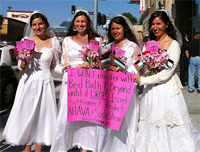By Nancy Kricorian, CODEPINK NYC Co-ordinator.
CODEPINK: Women for Peace is a grassroots peace and social justice movement that was founded in November 2002 as a women's peace vigil outside the White House. The name CODEPINK was chosen as a response to the Department of Homeland Security's color-coded advisory system. The government says Code Yellow for High Risk of Terrorist Attack and we say CODEPINK for Peace. In the past three years CODEPINK has grown to a national organization with over 90 local chapters.
CODEPINK employs a variety of tools and techniques for working towards positive social change, but we are known for our use of direct action and street theater.
First to define the terms:
Direct action is a political tactic of confrontation and sometimes-illegal disruption intended to attract and arouse public awareness and action. The Montgomery Bus Boycott in 1955 was an example of direct action that was successful in ending seating segregation on the public buses.
Street theater, sometimes called Guerilla Theater, involves the acting out of a social issue in a public space—that could be in a park, on the street or in a subway car. It is a form of direct action. There are a number of street theater groups here in New York, among them CODEPINK, the Billionaires for Bush, Greene Dragon, Reverend Billy and the Church of Stop Shopping. The Reverend Billy, for example, has performed exorcisms of cash registers in Starbucks stores to show his dislike of the corporate take-over of American life.
Civil disobedience, which is another form of direct action, involves the nonviolent act of breaking the law to call attention to a particular law or set of laws that some people think are immoral or questionable. An example of civil disobedience from the Civil Rights Movement was the “sit-in” campaign by African-American students in the south. The students would sit at Whites Only lunch counters, trying to show that it was wrong to have a law enforcing that kind of segregated seating. They would remain in their seats, in effect breaking the law, until the police were called in to drag them out.
CODEPINK has used direct action on numerous occasions to make our opposition to the war in Iraq known—during the Democratic and Republican National Conventions, during press conferences in Baghdad, and during the recent Presidential Inauguration. CODEPINK women have been popping up all over the place with our pro-peace message.
Why direct action?
You know the old _expression, “The squeaky wheel gets the grease?” Using direct action is a way of being a very squeaky wheel.
Huge media conglomerates control most of the information we see and hear about the world. Corporate-owned television outlets show us for the most part the version of reality that the current government wants us to know. For example, the Bush administration doesn't want us to see the dead bodies of Iraqi women and children who are killed in U.S. military campaigns. They don't want us to see the bodies of dead U.S. servicemen. These kinds of images are part of what turned public opinion against the Vietnam War and if we actually saw the devastation being caused with our tax dollars—and billions of our tax dollars—we might have something to say about it. By controlling the images we see they hope they can control our perceptions of and often feelings about the war in Iraq.
Direct action and street theater are ways to try to break through this control. A couple of dozen women dressed in pink, holding dolls wrapped in red-stained blankets and carrying a coffin show up in front of Donald Rumsfeld's house in Washington, D.C. and it might show up on the evening news. Medea Benjamin, dressed all in pink, stands up on her seat at the Republican National Convention during President Bush's acceptance speech. She is holding a banner and shouting END THE OCCUPATION NOW. The police come, pull her from her chair, and hustle her out of the auditorium. You might see only a flash of this on CNN, but a Pakistani taxi driver told me he had seen the whole “fight”, as he called it, on the nightly Pakistani cable news. When I told him that Medea Benjamin was in the back seat of his taxi he turned around to her and said, “You are a great lady.”
We believe that direct action works. A recent study on environmental activism by sociologist Jon Agnone showed that chaining yourself to a bulldozer and throwing paint over company executives is more likely to influence environmental policy than lobbying on Capitol Hill. And beyond having a direct influence on legislation, we believe that our street actions have an impact on our communities. It's about educating people. It's about making an alternative version of reality visible on the streets and on the news. We're angry about what's going on; we're standing up for our beliefs and principles, and we're strengthening our movement and ourselves by working together. And often we're also having a great time. | 







